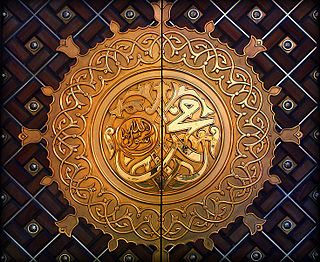Abdullah II of Jordan (born 1962) is the current King of Jordan.
Abdullah or Abdallah II may also refer to:

The Hashemites, also House of Hashim, are the royal family of Jordan, which they have ruled since 1921, and were the royal family of the kingdoms of Hejaz (1916–1925), Syria (1920), and Iraq (1921–1958). The family had ruled the city of Mecca continuously from the 10th century, frequently as vassals of outside powers, and were given the thrones of the Hejaz, Syria, Iraq, and Jordan following their World War I alliance with the British Empire; this arrangement became known as the "Sharifian solution".
Abd Allah, also spelled Abdallah, Abdellah, Abdollah, Abdullah, Abdulla, Abdalla and many others, is an Arabic name meaning "Servant of God". It is built from the Arabic words ʻabd (عبد) and Allāh (الله). Although the first letter "a" in Allāh, as the first letter of the article al-, is usually unstressed in Arabic, it is usually stressed in the pronunciation of this name. The variants Abdollah and Abdullah represent the elision of this "a" following the "u" of the Classical Arabic nominative case. Abd Allah is one of many Arabic theophoric names, meaning servant of God. God's Follower is also a meaning of this name.

The Banū Hāshim is an Arab clan within the Quraysh tribe to which Muhammad belonged, named after Muhammad's great-grandfather Hashim ibn Abd Manaf.
Abd al-Aziz, frequently also transliterated Abdul-Aziz, is a male Arabic Muslim given name and, in modern usage, surname. It is built from the words ʽAbd, the Arabic definite article and ʽAzīz "Almighty". The name is commonly abbreviated as "ʽAzīz". The name means "servant of the Almighty", al-ʽAzīz being one of the names of God in Islam, which give rise to the Muslim theophoric names.
Mongol ruler Ghazan Khan converted to Islam.
This is an alphabetical list of topics related to Islam, the history of Islam, Islamic culture, and the present-day Muslim world, intended to provide inspiration for the creation of new articles and categories. This list is not complete; please add to it as needed. This list may contain multiple transliterations of the same word: please do not delete the multiple alternative spellings—instead, please make redirects to the appropriate pre-existing Wikipedia article if one is present.
Yahya, also spelled Yehya, is an Arabic male given name. According to the Qur'anic narrative, it is an Arabic form of the given name John, originally Hebrew Yohanan, i.e. primarily John the Baptist, who is known as Yahya ibn Zakariyya in Islam, and is considered a prophet in Islam. For this reason, Yahya is a comparatively common name in the Muslim world. The related Biblical name of Jehiah has the Arabic form Yaḥiyyā يَحِيَّى., having the same Arabic consonantal text as the name Yahya does.
Sulayman is an Arabic name of the Biblical king and Islamic prophet Solomon meaning "man of peace", derived from the Hebrew name Shlomo.

Muhammad, also spelled Muhammed or Muhamad or Mohammad or Mohammed or Mohamad or Mohamed or in a variety of other ways, is an Arabic given male name literally meaning 'Praiseworthy'. The name comes from the passive participle of the Arabic verb ḥammada (حَمَّدَ), meaning 'to praise', which itself comes from the triconsonantal Semitic root Ḥ-M-D. Believed to be the most popular name in the world, by 2014 it was estimated to have been given to 150 million men and boys.
Izz ud-Din, Izz al-Din is an Arabic male given name meaning "high rank of the Islamic religion/ faith".
Abdelrahman or Abd al-Rahman or Abdul Rahman or Abdurrahman or Abdrrahman is a male Arabic Muslim given name, and in modern usage, surname. It is built from the Arabic words Abd, al- and Rahman. The name means "servant of the most gracious", ar-Rahman being one of the names of God in the Qur'an, which give rise to the Muslim theophoric names.
Abdul Malik is an Arabic male given name and, in modern usage, surname. It is built from the Arabic words Abd, al- and Malik. The name means "servant of the King", in the Christian instance 'King' meaning 'King of Kings' as in Jesus Christ and in Islam, Al-Malik being one of the names of God in the Qur'an, which give rise to the Muslim theophoric names.
Abu Sa'id Uthman II was the 10th Marinid sultan of Morocco, reigning from 1310 to 1331. A younger son of Abu Yusuf Yaqub ibn Abd al-Haqq, Abū Sa'īd 'Uthmān succeeded his nephew Abū al-Rabï' Sulaymān as Sultan of Morocco in November 1310, at the age of 33.

Turkey–Morocco relations are the foreign relations between Morocco and Turkey, and spanned a period of several centuries, from the early 16th century when the Ottoman Empire neighbored Morocco to until modern times.